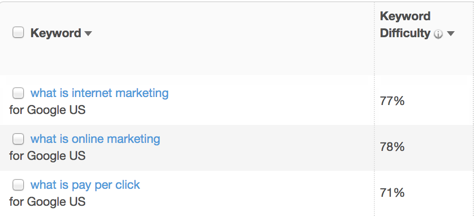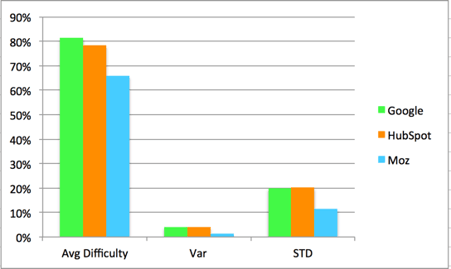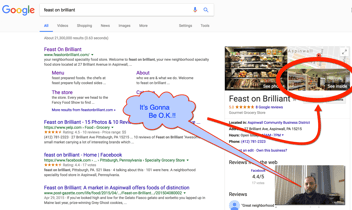For most websites, choosing keywords that are both relevant and have search volume simply isn’t enough anymore. Unless your clients are one of the few websites that has an established brand and online presence, chances are you’re going to find it tough to immediately be able to compete for that glorious page one spot for those money keywords.
Fortunately, there’s still hope. You can use keyword difficulty tools to find keywords that aren't as competitive as one another. The three we use here the most at ProFromGo are:
We decided to take a look into the numbers and see how these keyword measurements all relate to one another.
The Measurements
Before I delve into the the comparison, let me start by explaining how each of the tools arrives at their difficulty measurement.
Moz Keyword Difficulty
The Moz Keyword Difficulty Tool is one of the many tools you gain access to when you subscribe to a monthly Moz Pro plan. Once you sign up for a plan, you can simply access the tool and insert your desired keywords to determine their difficulties:

How does Moz calculate this score? As stated by former CEO of Moz, Rand Fishkin:
“Difficulty is currently based on the Page Authority + Domain Authority of the top 20 ranking results for a given query. We're trying to approximate the link "strength" or importance of the top results, and the formula uses a weighted average (so if there's weak pages in the first few results, the difficulty will be lower than if those weak pages are further down in the rankings). As for PA/DA - they're built using a machine-learning system. The inputs are the 40+ metrics from our web crawl and link graph (plus the hundreds of derivatives of those metrics) and the test set is ~10K Google search results. You can see more about this here - http://moz.com/learn/seo/domain-authority”
Be advised that I changed the link in the above quote to more accurately direct you to the best page describing domain and page authority.
Google Adwords Competition
When using the Google Keyword Planner, you may have seen the “Competition” column that informs you whether or not the competition is either "High", "Medium" or "Low".

However, if you’re a keyword research geek like me, you want to analyze the hard numbers behind it. Simply download this data and you will have access to the raw competition score Google assigns each keyword.
On Google’s website, they define the Competition measurement this way:
“The number of advertisers that showed on each keyword relative to all keywords across Google. Note that this data is specific to the location and Search Network targeting that you've selected. In the "Competition" column, you can see whether the competition for a keyword is low, medium, or high.
It’s important to keep in mind that this measurement only refers to the competition on Google AdWords and not the actual organic search results competition.
HubSpot Keyword Grader
The HubSpot Keyword Grader works very similarly the Moz Keyword Difficulty Tool. Upload your keywords to the tool and it automatically gives you a keyword score from 1-100.

Hubspot simply defines their keyword grader score as “how hard it is for you to get on the first page of search engine results for a particular keyword,”.
The Experiment
To test this out we first put together a list of 1,000 keywords from the Internet Marketing industry to ensure a larger sample size.

Note that we changed the “Google Competition” to a percentage in order to make it more easily comparable to the other two difficulties.
After compiling the list, it was simply a matter of calculating three different metrics:
- The Mean
- The Variance
- The Standard Deviation
The results ended up looking something like this:

For all you visual learners, here’s a nice little bar graph I compiled:

There are three immediate things that jump out at me when I look at these numbers. The first thing that’s evident are the average keyword difficulties. Please keep in mind that these are not average keywords difficulties across all industries. Every vertical is going to have different levels of keyword difficulty depending on how prominent the competition is there. For instance, personal injury related keywords are generally going to have higher difficulties than those related to the plumbing industry where the market isn’t quite as saturated, or where people generally spend less money on online visibility.
However, especially as marketers, it’s valuable to understand the average difficulties for the industry on each tool are as follows:
- Google: 81%
- HubSpot: 78%
- Moz: 66%
No matter which keyword tool you use, you can use these measurements as a general guideline to see whether the terms you’re researching are relatively competitive compared to the average.
The next trend that I noticed is that both Google Competition and HubSpot Difficulty measure significantly higher than Moz by about 13%-15%. Moz’s Keyword Difficulty measure clearly has a much higher threshold for what it considers to be keywords that are truly hard to compete for. The reason we observe this is also because HubSpot’s tool measures what it takes to get on the first page while Moz takes the entire top 20 into consideration when determining difficulty.
This can also service as a guideline for those who use Google Competition, but don’t subscribe to HubSpot's or Moz's premium tools. This data leads us to believe that Google Competition could be a good indicator of what the HubSpot difficulty looks like and, on average, ~15% higher than the Moz measure.
The final metric I calculated was the standard deviation of all the keyword difficulties across all three tools. Here, I noticed a very similar trend to the averages analyzed above. Both the Google and HubSpot standard deviations seem to be around the same, while the Moz keyword difficulties seem to stay much closer to the mean. Both Google & HubSpot difficulties fluctuate around the mean much more than than Moz. This is a good indicator as to the reliability of the data. In fact, Moz’s Keyword Difficulty measure is almost twice as reliable as HubSpot’s & Google’s. This gives Moz’s tool more credibility than the other two.
Conclusion
Is this experiement perfect? No. But it does give us some decent insight when comparing the different measures of keyword difficulty. I believe the three takeaways are these:
- The average difficulty for Internet Marketing related terms for Moz is 66% and ~80% for HubSpot & Google
- Both Google Competition score and HubSpot generally produce higher difficulty measures than Moz’s by about 12-15%
- Moz Keyword Difficulty scores are more reliable than both HubSpot & Google
If you have any other insight on the differences between these difficulties, I’d love for you to leave them in the comments below.





